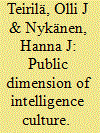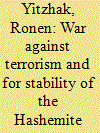|
|
|
Sort Order |
|
|
|
Items / Page
|
|
|
|
|
|
|
| Srl | Item |
| 1 |
ID:
145313


|
|
|
|
|
| Summary/Abstract |
Albania's intelligence transformation began in earnest after the end of the Cold War and the country's transition to democracy in 1991. In general, democratic reform of intelligence is an onerous and taxing process,1 given democracy's demand for transparency and accountability which competes with intelligence's demand for secrecy. Albania, as have other Central and Eastern European developing democracies, encountered a panoply of challenges and complexities in its intelligence democratization endeavors. Utilizing Sir David Omand's Cheshire Cat metaphor for intelligence and democracy, we attempt to identify whether Albania, after nearly two decades of democratization, and currently a North Atlantic Treaty Organization (NATO) member and European Union (EU) candidate status country
|
|
|
|
|
|
|
|
|
|
|
|
|
|
|
|
| 2 |
ID:
145310


|
|
|
|
|
| Summary/Abstract |
Historically, an observer could be forgiven for thinking that the art of fortune telling had been disguised by scientism and sold to national policymakers using descriptions like Estimative Intelligence, Long Range Analysis, and Strategic Futures.1 Policymakers, even when they should know better, harbor expectations that intelligence organizations should somehow accurately predict future events.2 The ability to predict phenomena relevant to foreign intelligence in the second half of the twentieth century was limited by a paucity of analytic methodologies, quantified data, and information technologies that could effectively exploit the data.3 Nonetheless, when compared to Cold War-era equivalents the newer analytic disciplines, improvements in analytic standards and methodologies, and advances in computational technologies are enhancing the scientific validity and reliability of Intelligence Community (IC) products. This generational shift in analytic rigor was codified in Intelligence Community Directive.
|
|
|
|
|
|
|
|
|
|
|
|
|
|
|
|
| 3 |
ID:
145311


|
|
|
|
|
| Summary/Abstract |
The summer of 2015 heralded the beginning of “Year Two” of the U.S.-led international coalition's airstrikes against Islamic State (IS)—also known interchangeably as the Islamic State of Iraq and al-Sham or Syria (ISIS), Islamic State of Iraq and the Levant (ISIL), and Da'esh. So far to date, the results of the campaign—indeed, what can be termed the campaigns that have been witnessed—against IS are hugely mixed. A highly complex, gradual, long-term approach is clearly underway and is expected to continue on that trajectory into the foreseeable future. Much patience requires sustained maintenance.
|
|
|
|
|
|
|
|
|
|
|
|
|
|
|
|
| 4 |
ID:
145315


|
|
|
|
|
| Summary/Abstract |
The health and broader biosecurity environment has evolved dramatically since 11 September 2001 (9/11). Less clear is the role intelligence should play in understanding emerging bio-threats. Understanding the role and limitations of intelligence in interpreting a complex set of potential “bio-threats” is essential as advances in synthetic biology and biotechnology grow exponentially. Questions remain, however, as to how well intelligence can function in managing this environment in ways that can reduce both the uncertainty and impact of health/biosecurity related risks and threats for policymakers, first responders, security managers, and public health officers,
|
|
|
|
|
|
|
|
|
|
|
|
|
|
|
|
| 5 |
ID:
145312


|
|
|
|
|
| Summary/Abstract |
Recent years have featured an unprecedented amount of intelligence-related public discussion in Finland. The revelations of Edward Snowden in the summer of 2013, the rise of cyber threats, and even the phenomenon of Finnish fighters in Syria have contributed to the discussion. Public debates, and the information provided, are key construction pieces for the development of intelligence legitimacy and trust between the people and the Intelligence Community (IC). The discussion contributes to transparency, often considered an essential part of 21st century governance. It also provides a window to the legality of actions that comprise the national intelligence cycle.
|
|
|
|
|
|
|
|
|
|
|
|
|
|
|
|
| 6 |
ID:
145316


|
|
|
|
|
| Summary/Abstract |
Moans swept through the dungeon floor. Between the sobs were sounds of a riotous dance. Do I hear two, not one, sound? Two such muffled sounds? One of pain, the other of dance? Am losing my mind? Listen. It is the meringue.
|
|
|
|
|
|
|
|
|
|
|
|
|
|
|
|
| 7 |
ID:
145314


|
|
|
|
|
| Summary/Abstract |
Analyzing raw information collected by humans to characterize prospective adversarial threats is a core function of intelligence, colloquially referred to as the “world's second oldest profession,” and dates back across multiple millennia to antiquity.1234567 For example, Homer's epic poem The Illiad refers to the use of spies by the Greeks and Trojans.
|
|
|
|
|
|
|
|
|
|
|
|
|
|
|
|
| 8 |
ID:
145309


|
|
|
|
|
| Summary/Abstract |
Since its establishment in 1921, the Jordanian Hashemite regime has endured uprisings and coup attempts from Jordanians, Palestinians, and foreigners. Jordanian intelligence, which has played a significant role in maintaining the stability of the Hashemite kingdom, is considered one of the most effective intelligence agencies in the world. According to Los Angeles Times correspondent Ken Silverstein, it has surpassed Israel's Mossad as America's most effective allied counter-terrorism agency in the Middle East.
|
|
|
|
|
|
|
|
|
|
|
|
|
|
|
|
|
|
|
|
|